BREAD AND TULIPS
directed by Silvio Soldini with Licia Maglietta and Bruno Ganz opens Aug. 17 at Seven Gables
LICIA MAGLIETTA is a marvel. All yielding curves, slow-blossoming smiles, and liquid eyes, the actress radiates a gentle sensuality that’s all the more alluring for how unaware she is of her own loveliness. On screen, there’s more eroticism in the crinkle of her eyes and the softness of her tummy than in a thousand over-Pilated American stars whose gravity-defying breasts jut out from angular bodies designed for adolescent boys.
Alas, Maglietta is by far the best thing about this determinedly quirky and cream-puff-light film. Given the generally poor state of today’s Italian cinema (where crude slapstick predominates), Bread‘s nine Donatellos—the Italian Oscar equivalent—signal a certain prestige, but one that won’t translate to any but the most sentimental and forgiving audiences.
Maglietta stars as a 40ish housewife whose vacation with her two indifferent sons and boorish husband is cut short when she’s left behind at a tour bus rest stop. Sensibly deciding to hitchhike home, Rosalba finds herself passing near Venice—the city she always dreamed of as a girl. After spending the night in a dim pensione and wandering through the cobbled, canal-lined streets, Rosalba decides, with very little fanfare, on a life-altering change of address. She soon finds a room with an odd, kindly, suicidal waiter named Fernando (Wings of Desire‘s Bruno Ganz, speaking primarily in melancholy free verse) and a job working for a crotchety old anarchist florist.
Bread‘s parade of relentlessly oddball characters continues with a wacky holistic masseuse, a portly plumber-detective hired by Rosalba’s disgruntled husband to track her down, and an angry young woman who may or may not be the wife of gloomy Icelandic (!) Fernando, with whom Rosalba begins a tentative affair.
It’s all very complicated, and it all, of course, works out marvelously in the end, pushed along by several disorienting episodes of magical realism and a host of misunderstandings and near-misses. Soldini’s Italy isn’t the same lushly photographed paradise of The Talented Mr. Ripley or Stealing Beauty. Instead, it’s a rather ordinary place where Maglietta emanates far more light than the Venetian sun’s pale and watery rays. The film also begs comparison to last year’s superior Chocolat, but while Bread‘s sentimentalism and deliberate eccentricity are equally saccharine, Soldini can’t draw characters with Lasse Hallstr� subtlety. Certainly the fantasy of a middle-aged woman leaving behind the drudgery and demands of an unappreciative family is universal. For that intended audience demographic, Bread‘s appeal will last about as long as it takes to digest a plateful of sweet, gooey cannoli.








